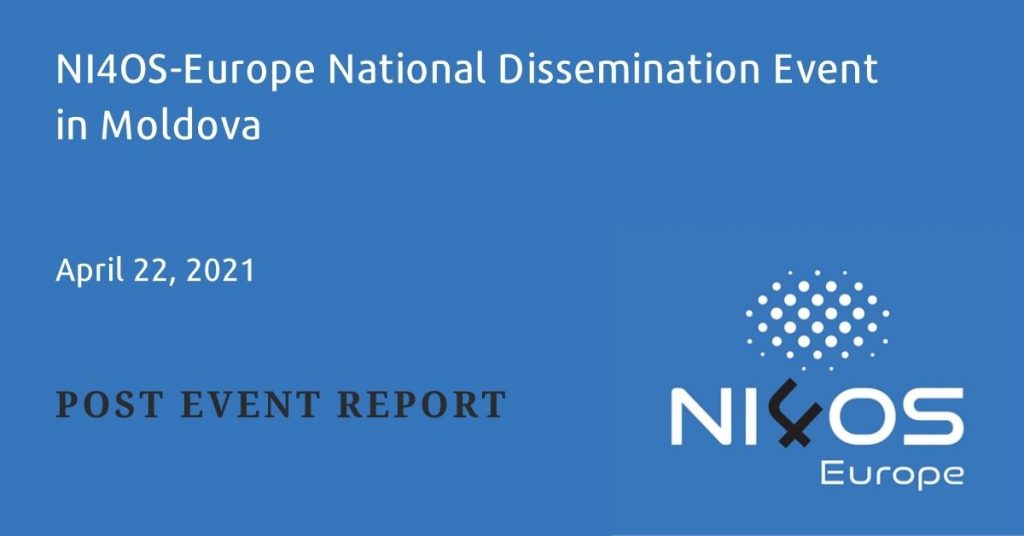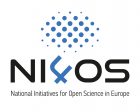“Different actors and stakeholders need to work together!” – this was the main message of the NI4OS-Europe National Dissemination Event in Moldova held on April 22, 2021.

This three-and-a-half-hour online event was attended by 86 representatives of Moldovan universities and research institutions, librarians and policy makers. The event was organized by the Research and Educational Networking Association of Moldova (RENAM), as the NI4OS-Europe project partner, with support of the Ministry of Education, Culture and Research of the Republic of Moldova, the National Agency for Research and Development and the Academy of Sciences of Moldova.
We are proud to announce that NI4OS-Europe Training Platform has successfully helped to make this happen as online event, because of the current pandemic restrictions. Thanks to it, all slides and video recording are available for stakeholders – 112 registered persons can view these materials in any suitable time after the event.
Speeches and presentations, minute by minute
The event started with an introduction given by the official representative of the National Agency for Research and Development, Dr. Habil., Prof. Serghei Sprincean, who outlined the history of the European Research Area initiative and Open Science as one of the effective solutions to attract the general public. He noted the existing discrepancies, difficulties and challenges for the Republic of Moldova, while stressing that edification of the national system of Open Science should be based on the principle of synergy and interoperability, cooperation and collaboration, taking into account Romania’s experience.
Olga Tretiacov, principal consultant of the Directorate for Research and Innovation Policy of the Ministry of Education, Culture and Research of the Republic of Moldova, delivered a welcome speech. She presented information about the current state of negotiations on Moldova’s accession to Horizon Europe, the new European Union Programme for Research and Innovation (2021-2027), and concrete actions related to integration of the Republic of Moldova into the European Research Area, through which the promotion of the Open Science concept is also realized.
After that, the President of the Academy of Sciences of Moldova, Acad., Prof. Ion Tiginyanu, emphasized the importance of Open Science in the current situation of fighting the COVID-19 pandemic, when the solution can come only from researchers and requires a consolidated effort on a global scale. He drew the attendees’ attention to the 6 key elements of Open Science (open data, open source, open methodology, open peer review, open access and open educational resources) and accentuated the need to create and support national infrastructures and common open technological platforms dedicated to the whole community, despite the problems we face.
The first presentation was given by Dr. Peter Bogatencov, Chairman of the RENAM Management Board, who introduced the objectives of NI4OS-Europe project, its mission and contribution to EOSC (European Open Science Cloud), project organizational structure and regional context, the National Open Science Cloud Initiatives and policy support, recently implemented activities (including support the global efforts on COVID-19) and set of deliverables. As well the information about the EOSC initiative, scope and updates, structure of the minimum viable EOSC and plans for its iterative deployment, establishment of the EOSC Association and Association membership types was provided.
In the second presentation Alexandr Golubev of RENAM talked about the possibilities to access the EOSC services through the EOSC portal, search by scientific domains or categories of services and basic details available for each service in the EOSC catalogue. In addition, practical aspects of the procedure for services on-boarding into EOSC and components of the NI4OS-Europe pre-production environment, designed to include generic services (compute, data storage, data management), thematic services and repositories, were highlighted.
In the third presentation Dr. Peter Bogatencov informed the present audience about the methodology for setting up National Open Science Cloud Initiatives, their main operational aspects, interaction with EOSC, 3 possible organizational and governance models (top down, bottom up and hybrid) that ensures long-term sustainability, list of concrete steps in the planned workflow and recommendations regarding signing a Memorandum of Understanding.
In the fourth presentation Dr. Habil., Prof. Nelly Țurcan of Moldova State University and Information Society Development Institute, national EOSC promoter, stressed the need for Open Science as a key cross-cutting factor supporting progress in technology and innovation. She paid special attention to complexity of the Open Science concept, its evolution and the international initiatives launched in the last years (including Open Research Europe – an open access publishing platform offering rapid publication and open peer review). Mentioning some progress in the Republic of Moldova in the development of open access institutional and editorial policies, the rapporteur presented recent analyzes/syntheses on the existing national policies in other countries and implementation of the Open Science practices, the typical structure of a national open access policy, examples and models of institutional Open Science policies and benefits from the adoption of these documents.
Lastly, Viorica Lupu, Deputy Director of the Republican Agricultural Scientific Library of the State Agrarian University of Moldova, gave an overview of the process of a research data management plan development, its need and benefits for both researchers and research funding organizations. The information about the basic elements, particularities to be taken into account in practice and the existing online tools to facilitate a data management plan development was provided.
